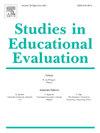建立社群,编织信任:集体主义导向的儒家文化背景下,校长如何将参与式领导实践转化为教师职业幸福
IF 2.6
2区 教育学
Q1 EDUCATION & EDUCATIONAL RESEARCH
引用次数: 0
摘要
本研究立足于中国以集体主义为导向的儒家文化背景,从生态系统理论和社会资本理论两方面考察了参与式领导对教师职业幸福感的影响机制。结构方程模型分析发现了参与式领导对职业幸福感的直接正向效应、信任型人际氛围的间接中介效应和专业学习社区与信任型人际氛围的序次中介效应。研究结果表明,中国学校领导实践独特地将社区发展与信任建设结合起来,协同提升教师职业幸福感。这种嵌入文化的机制也表明,儒家价值观可以通过强调决策过程中相互的人际义务和集体和谐来重新配置参与式领导的动力。本文章由计算机程序翻译,如有差异,请以英文原文为准。
Building communities, weaving trust: How principals transform participative leadership practices into teacher professional happiness in collectivism-oriented Confucian cultural context
Grounded in China’s collectivism-oriented Confucian cultural context, this study examines the mechanism through which participative leadership influences teacher professional happiness from the perspectives of Ecological Systems Theory and Social Capital Theory. Structural equation modeling analysis identified three significant pathways, including a direct positive effect of participative leadership on professional happiness, an indirect effect mediated solely by trust-based interpersonal climate, and a sequential mediation effect through professional learning communities followed by trust-based interpersonal climate. The findings demonstrate that Chinese school leadership practices uniquely combine community development and trust-building to synergistically enhance teacher professional happiness. This culturally-embedded mechanism also suggests that Confucian values may reconfigure participative leadership dynamics by emphasizing reciprocal interpersonal obligations and collective harmony in decision-making processes.
求助全文
通过发布文献求助,成功后即可免费获取论文全文。
去求助
来源期刊

Studies in Educational Evaluation
Multiple-
CiteScore
6.90
自引率
6.50%
发文量
90
审稿时长
62 days
期刊介绍:
Studies in Educational Evaluation publishes original reports of evaluation studies. Four types of articles are published by the journal: (a) Empirical evaluation studies representing evaluation practice in educational systems around the world; (b) Theoretical reflections and empirical studies related to issues involved in the evaluation of educational programs, educational institutions, educational personnel and student assessment; (c) Articles summarizing the state-of-the-art concerning specific topics in evaluation in general or in a particular country or group of countries; (d) Book reviews and brief abstracts of evaluation studies.
 求助内容:
求助内容: 应助结果提醒方式:
应助结果提醒方式:


